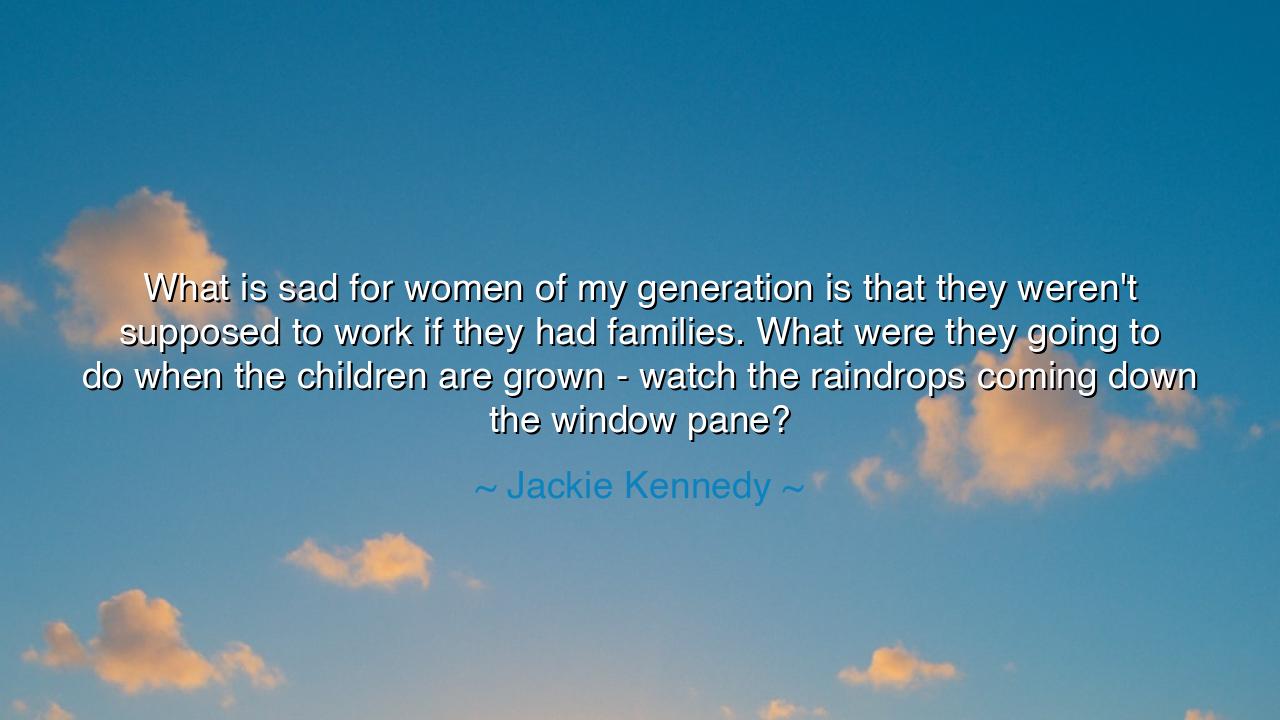
What is sad for women of my generation is that they weren't
What is sad for women of my generation is that they weren't supposed to work if they had families. What were they going to do when the children are grown - watch the raindrops coming down the window pane?






In the tender and reflective words of Jacqueline Kennedy, we find not a lament for herself, but for a generation of women confined by quiet sorrow: “What is sad for women of my generation is that they weren’t supposed to work if they had families. What were they going to do when the children are grown—watch the raindrops coming down the window pane?” This is no idle remark; it is a cry from the heart of a woman who lived within the golden walls of privilege yet saw the emptiness that can dwell behind them. Her words speak to the yearning of the soul for purpose, the longing to remain alive in spirit even after the roles of motherhood and wifehood have quieted.
The origin of this quote lies in the shifting tides of the mid-twentieth century, when women stood between two worlds. The old world whispered that their place was in the home, tending to children and keeping the hearth warm. The new world, born from the ashes of war and the roar of change, called them to seek meaning beyond domestic duty, to learn, to create, to lead. Jacqueline Kennedy, herself the image of grace and refinement, saw the invisible sorrow of countless women who had fulfilled every expectation of their time—and then found themselves stranded, their children grown, their identity dissolved into silence. Her words are a mirror held up to that quiet tragedy.
In her reflection, Jackie Kennedy was not condemning family life, but mourning a world that denied women the right to grow alongside their families, rather than within the boundaries of them. She knew that love for one’s children is sacred, but she also knew that love without self-fulfillment leaves the spirit barren. The image she paints—of a woman watching raindrops trickle down a windowpane—is not merely poetic; it is symbolic of stagnation, of the slow passing of time unclaimed, of dreams deferred until they dissolve into the mist. To watch the rain, powerless to shape its course, is to live as a spectator to one’s own existence.
Consider, for instance, the life of Betty Friedan, whose book The Feminine Mystique in 1963 ignited the modern women’s movement. Friedan, like many of her peers, was a housewife and mother who once accepted the dream sold to her generation: that happiness lay in perfect homes, obedient children, and a loving husband. But as she looked around at her friends—educated, intelligent women fading into loneliness—she recognized what Jackie Kennedy would later echo: that women had been taught to sacrifice their minds for their families, only to discover, too late, that their minds had withered for lack of use. Out of that recognition rose a movement that redefined womanhood not as confinement, but as freedom in partnership with duty.
Jackie’s words, though soft, contain the fire of transformation. She saw that no society can flourish when half of its people are taught to diminish their own light. She believed that beauty and intellect, motherhood and ambition, tenderness and strength could coexist in the same soul. To her, the tragedy of her generation was not that women had served their families—it was that they had been told that service was the sum of their worth. Her reflection calls forth a new vision: that every woman must nurture not only her children, but also her own dreams, her art, her mind, her spirit.
The lesson, then, is one of balance and awakening. Each of us—man or woman—must seek to live a life that continues to grow, even as the seasons of our duty change. The mother must remember she is still a woman; the father must remember he is still a soul, not merely a provider. When the house grows silent and the world slows, it is not the end of purpose—it is the moment to begin anew. Those who prepare for this moment by cultivating inner life will never be left to count the raindrops in sorrow, for within them will still burn the light of becoming.
So, my children, take this teaching to heart: do not let your worth be defined by a single role. Serve your loved ones with all your heart, but never forget the part of you that dreams, learns, and creates. Let your work—whatever it may be—flow like a river through every season of your life. For the world needs not only nurturers of others, but also nurturers of truth and beauty. And when the rain comes to your window, may you not sit and watch, but rise—and step into it—knowing you have lived a life that was entirely, gloriously your own.






AAdministratorAdministrator
Welcome, honored guests. Please leave a comment, we will respond soon